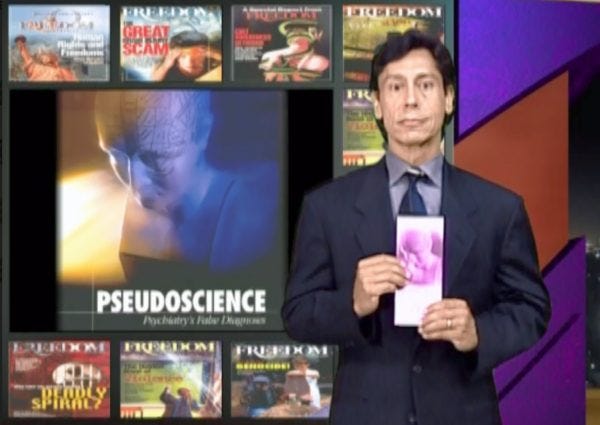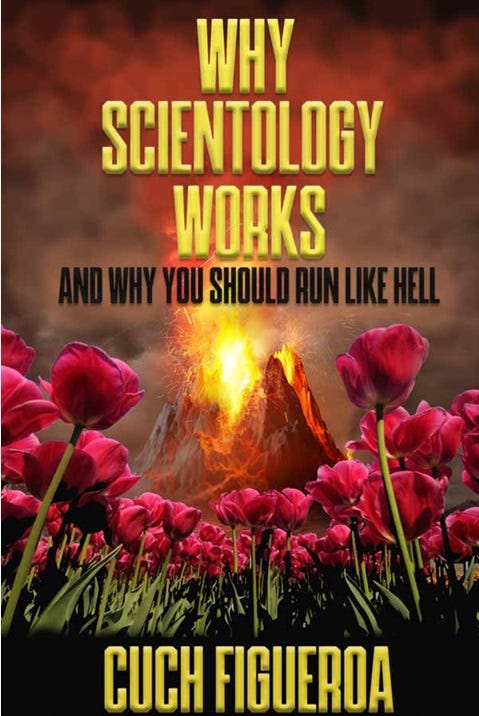With a title like Why Scientology Works: And Why You Should Run Like Hell, the new memoir out today by former Scientology staffer Cuch Figueroa struck us as both clever and provocative way to grab attention.
But what exactly did he mean by it? Scientology, works?
Almost right away, however, Figueroa lets us know where he stands.
“That giant sucking sound you heard on Friday, October 14th, 2011, was me pulling my head out of my ass and declaring in an email to my brother, Fred, a former staff member for over twenty years, that I was no longer a Scientologist.”
Have to admit, he really had us hooked at that point.
Figueroa’s book is an engaging narrative and a familiar one, if you’ve read other books by former Scientologists describing how they got into and then got out of this restrictive, totalitarian group.
But we really think Why Scientology Works is a valuable addition to the literature for several reasons.
First of all, Figueroa’s path to Scientology is one of the more unusual ones we’ve ever read, involving some crazy times in his youth and a stint in the military. But most of all, what sets this book apart is that it gives us some of the clearest storytelling about what it was like to run one of Scientology’s rabid anti-psychiatry branches, and the extreme fundraising that went with it.
It’s impossible to exaggerate how much Scientology hates the psychiatric profession. Founder L. Ron Hubbard made it a cornerstone of the Scientology movement, literally telling his followers that psychiatry is the most evil force in the universe, and that psychiatrists have been around for trillions of years implanting booby-traps in the minds of “thetans,” the immortal beings that we are.
Current leader David Miscavige makes no secret of Scientology’s ongoing mission to destroy the mental health profession and replace it with Hubbard’s quack ideas about the mind.
The branch of Scientology whose job it is to carry out that mission is a front group that calls itself the Citizens Commission on Human Rights (CCHR), and Figueroa writes about how he led one of its busiest and most ambitious branches, Florida CCHR, in the 1980s and 1990s.
And like a lot of ex-Scientologists, Figueroa can’t help still feeling the thrill of what it was like to be a soldier in an ongoing war — in this case, helping CCHR gain visibility by attacking a psychiatric hospital that was found to be abusing its patients.
If you are still unclear on the way that Scientology convinces its members that it is part of a mission that is literally the most important thing in the world, Figueroa’s story has some really excellent examples of this. Yes, he has left it behind, but he still vividly remembers how righteous he felt helping to expose and shut down a psychiatric institution for the cause.
Increasingly, however, Figueroa’s time was taken up with raising money to put on lavish events, and bringing in non-Scientologist figures, fellow-travelers in the anti-psychiatry realm who were willing to lend their name to the cause.
Scientology has always been curiously successful with this, and Figueroa gives us some really interesting examples of it, describing his relationship with academics and others who were willing to help CCHR advance its agenda.
But perhaps his greatest “get” was convincing CCHR’s founder, Thomas Szasz, to give a keynote speech at an annual gala in September 2001. The 9-11 attacks threw a wrench into those plans, with all air traffic being shut down for days and Szasz unable to get to the event. But Figueroa found a way to save the day.
Like other talented, dedicated former Scientologists who have written memoirs, however, inevitably we get to why we’re reading a book by them: The church of Scientology always finds a way to drive such effective people away. And Figueroa is no different.
And now that he’s out, he’s achieved clarity about where he has been and how he feels about things now. In fact, he spends some time offering some alternative ways to look at how the world works and the best ways to seek enlightenment, some of which may agree with the reader or not. But we certainly credit him for having the fortitude to re-examine his involvement and describe it in a very entertaining tale.
We want to thank him for giving us an advance look at the book, and he wanted us to mention that he has deeply discounted the book for its launch in order to encourage readers to give the book a try and submit reviews to Amazon. Seems like a smart strategy.
We think you’ll enjoy the book if you give it a try.
Want to help?
Please consider joining the Underground Bunker as a paid subscriber. Your $7 a month will go a long way to helping this news project stay independent, and you’ll get access to our special material for subscribers. Or, you can support the Underground Bunker with a Paypal contribution to bunkerfund@tonyortega.org, an account administered by the Bunker’s attorney, Scott Pilutik. And by request, this is our Venmo link, and for Zelle, please use (tonyo94 AT gmail). E-mail tips to tonyo94@gmail.com.
Thank you for reading today’s story here at Substack. For the full picture of what’s happening today in the world of Scientology, please join the conversation at tonyortega.org, where we’ve been reporting daily on David Miscavige’s cabal since 2012. There you’ll find additional stories, and our popular regular daily features:
Source Code: Actual things founder L. Ron Hubbard said on this date in history
Avast, Ye Mateys: Snapshots from Scientology’s years at sea
Overheard in the Freezone: Indie Hubbardism, one thought at a time
Past is Prologue: From this week in history at alt.religion.scientology
Random Howdy: Your daily dose of the Captain
Here’s the link to today’s post at tonyortega.org
And whatever you do, subscribe to this Substack so you get our breaking stories and daily features right to your email inbox every morning.
Paid subscribers get access to two special podcast series…
Up the Bridge: A journey through Scientology’s actual “technology”
Group Therapy: Our round table of rowdy regulars on the week’s news





Cuch Figueroa joins the ranks of some great writers and tellers of truth.
"This story celebrates the triumph of the individual spirit over adversity and is a poignant reminder of the power of self-awareness and the importance of questioning authority."
https://www.amazon.com/Scientology-Works-Should-Like-Hell-ebook/dp/B0D4JCKFJT/
I love a good escape story. The button for 'read for free' is correct, but you have to Join 'Kindle Unlimited', but you get 3 months to read Cuch's book. That should be easy to do.
Because Hubbard couldn’t get the mental health help he wanted, and honestly needed, for free after his undecorated military career, he turned his military career into a lie and made a career of attacking the people who would not help him. It’s good to have people like Cuch exposing the truth.